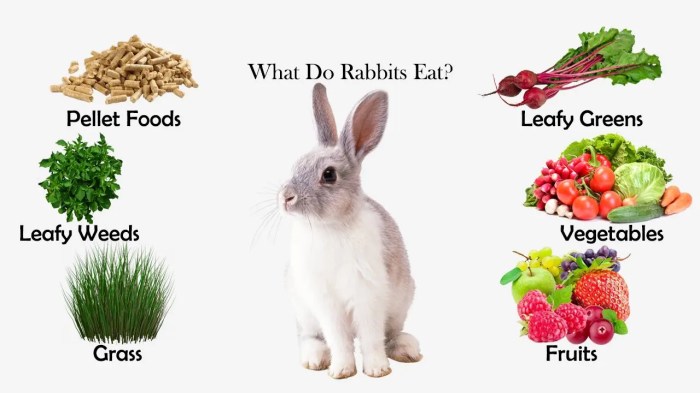Rabbits and dogs have distinct dietary needs due to their varying anatomies and physiologies. As a responsible pet owner, understanding the nutritional requirements of your furry friends is crucial. This article delves into the topic of whether rabbits can safely consume dog food, exploring its nutritional composition, potential health risks, and suitable alternatives.
To begin, we will compare the nutritional content of dog food and rabbit food, highlighting the differences in essential nutrients. We will then examine the unique digestive system of rabbits and how it differs from that of dogs. Subsequently, we will discuss the potential health risks associated with rabbits consuming dog food, including obesity, digestive upset, and nutritional deficiencies.
Digestive System of Rabbits

Rabbits possess a unique digestive system that is distinct from that of dogs. Their digestive system is adapted to process a diet primarily composed of fibrous plant material.
The rabbit’s digestive system includes a cecum, which is a large pouch located between the small and large intestines. The cecum plays a crucial role in the fermentation of plant material. Microorganisms within the cecum break down the cellulose and other complex carbohydrates present in plant matter, producing volatile fatty acids (VFAs) as a byproduct.
These VFAs are absorbed by the rabbit’s body and serve as an important energy source.
Hindgut Fermentation
In addition to the cecum, rabbits also have a hindgut fermentation system. This system consists of the colon and rectum, where further fermentation of plant material occurs. The hindgut fermentation system is responsible for the production of soft, moist feces known as cecotropes.
Cecotropes are reingested by rabbits, allowing them to extract additional nutrients from the partially fermented plant material.
Potential Health Risks
Rabbits have a unique digestive system that is designed to process plant-based foods. Dog food, on the other hand, is high in protein and fat, which can be difficult for rabbits to digest. Consuming dog food can lead to several potential health risks for rabbits.
Obesity
Dog food is typically high in calories, and rabbits that consume it regularly may become obese. Obesity can lead to a number of health problems in rabbits, including heart disease, respiratory problems, and arthritis.
Digestive Upset
The high protein and fat content of dog food can also cause digestive upset in rabbits. Symptoms of digestive upset can include diarrhea, vomiting, and abdominal pain. In severe cases, digestive upset can lead to dehydration and malnutrition.
Nutritional Deficiencies
Dog food does not contain all of the nutrients that rabbits need to stay healthy. Rabbits that consume dog food regularly may develop nutritional deficiencies, which can lead to a variety of health problems. Some of the nutrients that rabbits may be deficient in if they consume dog food include:* Fiber
- Vitamin A
- Vitamin C
- Calcium
- Phosphorus
Alternatives to Dog Food
Since dog food is not suitable for rabbits, it is essential to provide them with a balanced diet that meets their specific nutritional needs. Fortunately, there are several healthy and nutritious alternatives to dog food that are safe for rabbits to consume.
A rabbit’s diet should primarily consist of hay, fresh vegetables, and a limited amount of commercial rabbit food. Here are some specific options to consider:
Fruits
- Apples (without seeds)
- Bananas (small amounts)
- Berries (such as blueberries, raspberries, and strawberries)
Vegetables
- Asparagus
- Broccoli
- Brussels sprouts
- Carrots
- Celery
- Collard greens
- Dandelion greens
- Kale
- Parsley
- Spinach
Commercial Rabbit Food
When selecting commercial rabbit food, choose one that is specifically formulated for rabbits and avoid those that contain high levels of protein or fat. Some reputable brands of rabbit food include:
- Oxbow Animal Health
- Kaytee
- Mazuri
Last Word
In conclusion, while dog food may provide some nutritional value to rabbits in small quantities, it is not an optimal or balanced diet for these herbivores. The unique digestive system of rabbits requires a diet rich in fiber and low in protein and fat, which is best met by a combination of hay, fresh vegetables, and commercial rabbit food.
By understanding the nutritional needs of your rabbit and providing them with an appropriate diet, you can ensure their optimal health and well-being.
Answers to Common Questions
Can rabbits eat dog food on a regular basis?
No, dog food is not a suitable regular diet for rabbits. It is too high in protein and fat, and low in fiber, which can lead to health problems.
What are the potential health risks of rabbits eating dog food?
The potential health risks include obesity, digestive upset, and nutritional deficiencies. Dog food is high in calories and fat, which can lead to weight gain and obesity in rabbits. It is also low in fiber, which can cause digestive problems such as diarrhea and constipation.
Additionally, dog food may not contain all of the nutrients that rabbits need, which can lead to nutritional deficiencies.
What are some healthy alternatives to dog food for rabbits?
Healthy alternatives to dog food for rabbits include hay, fresh vegetables, and commercial rabbit food. Hay should make up the majority of a rabbit’s diet, and it provides essential fiber for their digestive system. Fresh vegetables are a good source of vitamins and minerals, and commercial rabbit food provides a balanced diet that contains all of the nutrients that rabbits need.